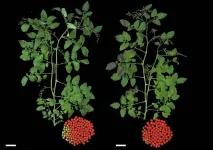(Press-News.org) Toronto, ON – New challenges in HIV prevention and care are emerging due to climate change, according to a review published earlier this month in Current Opinions in Infectious Disease.
Researchers from the University of Toronto analyzed 22 recent studies exploring HIV-related outcomes in the context of climate change and identified several links between extreme weather events and HIV prevention and care.
Climate change-related extreme weather events, such as drought and flooding, were associated with poorer HIV prevention outcomes, including reduced HIV testing. Extreme weather events were also linked to increased practices that elevate HIV risk, such as transactional sex and condomless sex, as well as increases in new HIV infection.
“Climate change impacts HIV prevention through several mechanistic pathways,” says lead author Carmen Logie, Professor at the Factor-Inwentash Faculty of Social Work (FIFSW) at the University of Toronto and the United Nations University Institute for Water, Environment, and Health. “Extreme weather events cause structural damage to health care infrastructure and increase migration and displacement, both of which disrupt access to HIV clinics for prevention and testing. We also see increases in practices that increase HIV risk due to climate change-related resource scarcity.”
The study also uncovered important implications for HIV care among those already living with HIV, such as reduced viral suppression, poorer treatment adherence, and worse physical and mental wellbeing.
“Extreme weather events present new challenges with access to HIV care and treatment adherence,” said co-author Andie MacNeil, PhD student at the FIFSW at the University of Toronto. “Multilevel strategies are needed to mitigate the effects of climate change on HIV care, such as long-lasting antiretroviral therapy, increased medication dispensing supplies, and community-based medication delivery and outreach programs.”
The authors highlighted several important gaps in the existing literature, including the lack of research on specific extreme weather events (e.g., extreme heat, wildfires, hurricanes) and in geographic areas with high climate change vulnerability and increasing HIV rates (e.g., the Middle East and Northern Africa).
They also described a persisting lack of knowledge on extreme weather events and HIV among key marginalized populations, including sex workers, people who use drugs, and gender diverse persons, as well as how extreme weather events interact with intersecting forms of stigma.
The researchers are hopeful that these findings can help offer ways forward for research, policy, and practice.
“Innovative HIV interventions, such as long-acting PrEP, mobile pharmacies and health clinics, and interventions that reduce food and water insecurity may all contribute to improving HIV care during extreme weather events. More research and evaluation is needed to test climate-change informed HIV prevention and intervention strategies,” said Logie. “The integration of disaster preparedness and HIV care provides new opportunities to optimize HIV care in our changing climate.”
Funding:
Carmen Logie was supported by Canadian Institutes of Health Research (CIHR) (Project Grants), Social Sciences and Humanities Research Council of Canada (Partnership Development Grant, Insight Grant), and the Canada Research Chairs Program. Funders played no role in the study design, analysis or interpretations.
END
Climate change linked with worse HIV prevention and care
Researchers find that climate change and extreme weather events impact HIV prevention and care through numerous pathways, including increased HIV exposure, reduced testing, and worse health outcomes for people living with HIV
2025-01-08
ELSE PRESS RELEASES FROM THIS DATE:
Exeter launches second round of global funding to tackle antifungal drug resistance
2025-01-08
A University of Exeter funding scheme designed to combat the global challenge of fungal antimicrobial resistance (fAMR) has announced a new call for applications.
The FAILSAFE project (Fungal AMR Innovations for LMICS: Solutions and Access For Everyone) is a groundbreaking initiative tackling antifungal drug resistance. The project aims to promote worldwide innovations to tackle the global health threat of fungal infections in humans, plants and animals increasingly growing resistant to available treatment.
Already, the FAILSAFE project has awarded more than £1.7 million in grants ...
Harnessing AI to respond to the global threat of antimicrobial resistance
2025-01-08
AMR is when microorganisms that cause infections, such as bacteria and viruses, change over time and no longer respond to antibiotic medicines.
It makes serious conditions such as HIV, tuberculosis and malaria more difficult to treat and increases the risk of severe illness, disease spread and death.
AMR particularly impacts low-to-middle-income countries where water quality is often poor and the spread environmental spread of AMR via wastes can be high.
In 2015 the World Health Organization (WHO) formulated a Global Action Plan to co-ordinate efforts to tackle AMR.
As a result, 194 WHO member states committed to developing country-specific ...
New findings may help researchers develop a grapefruit devoid of compounds that affect medication levels
2025-01-08
Grapefruit and pummelo contain compounds called furanocoumarins that may affect the blood levels of more than 100 prescription drugs, so that people taking these medications are advised to remove these fruits from their diets. Research published in New Phytologist reveals genetic information about the synthesis of furanocoumarins in different citrus plant tissues and species and provides new insights that could be used to develop grapefruit and pummelo that lack furanocoumarins.
The research indicates that the production of furanocoumarins in citrus ...
Advanced wearable robot eases heavy lifting and other injury-causing tasks for workers
2025-01-08
In research published in Advanced Intelligence Systems, scientists have developed an innovative, soft, wearable robot to help workers avoid job-related injuries while lifting, lowering, and carrying objects.
While many available wearable robots are limited to supporting a single degree of freedom of the body (meaning the body can only move in one direction at a given joint), the new robot, called WeaRo, operates through multiple degrees of freedom, allowing for complex movements.
In tests, WeaRo effectively reduced the muscle activation levels of lumbar, biceps, and triceps muscles by a maximum of 18.2%, 29.1%, and ...
Does job strain compromise long-term sleep quality?
2025-01-08
In a recent study published in the American Journal of Industrial Medicine, middle aged workers in the U.S. who reported high job strain at the start of the study experienced significantly more sleep disturbances over an average follow-up of nine years.
The study analyzed data from 1,721 workers, with an average age of 51 years, who participated in the Midlife in the United States (MIDUS) study. Sleep disturbances were assessed with an established scale, based on four sleep-related symptoms: trouble falling asleep, waking up during ...
Artificial intelligence–based method assesses depression in business leaders
2025-01-08
Researchers have developed a novel method to assess depression in CEOs by using machine learning models (a type of artificial intelligence) to analyze vocal acoustic features from conference call recordings. This innovative approach, detailed in an article published in the Journal of Accounting Research, provides insights into a mental health issue that often remains hidden in high-pressure executive roles.
The researchers examined how CEO depression is related to career outcomes, compensation, and incentives. Their findings suggest ...
Study assesses the benefits of alfalfa-almond intercropping
2025-01-08
The practice of growing different but complementary plants within a given area, also known as intercropping, has numerous positive effects such as reduced soil erosion, weed suppression, nitrogen fixation (the conversion of atmospheric nitrogen to nitrogen compounds that can be used by plants and other organisms), and pollinator benefits. New research published in Agrosystems, Geosciences & Environment reveals the increased land use efficiency and environmental benefits in an alfalfa–almond intercropped ecosystem ...
Mediterranean sharks continue to decline despite conservation progress
2025-01-08
Overfishing, illegal fishing and increasing marketing of shark meat pose significant threats to the more than 80 species of sharks and rays that inhabit the Mediterranean Sea, according to a new study.
The research examined current levels of legislation in place to protect elasmobranch populations (which include sharks, rays and skates) within each of the 22 coastal states of the Mediterranean region.
Across those countries – stretching from Spain and Morocco in the west to Israel, Lebanon and Syria in the east – the researchers identified more than 200 measures that concern elasmobranchs in some ...
New treatment option for severe hypertrophic cardiomyopathy in children shows promise
2025-01-08
Trametinib, a mitogen-activated protein kinase (MEK) inhibitor, reduces mortality and morbidity in children with severe hypertrophic cardiomyopathy (HCM) caused by pathogenic variants in the RAS/MAPK pathway, according to a study published today in JACC: Basic to Translational Science. The study provides strong evidence for personalized treatment targeting the underlying genetic causes of RASopathies, a group of rare disorders that often lead to life-threatening cardiac complications.
“Our findings represent a breakthrough in the treatment of HCM in children, particularly those suffering from severe forms of the disease due to genetic variants in the RAS/MAPK ...
Repairing a domestication mutation in tomato leads to an earlier yield
2025-01-08
Genome editing with CRISPR-Cas is often associated with the induction of mutations. However, a team of researchers from the Swiss University of Lausanne now shows that it can also be used to repair natural mutations.
All living organisms mutate, which is a major driver of biodiversity and evolution. Humans have been domesticating plants for thousands of years, by selecting mutations that lead to favorable characteristics such as larger or more numerous fruits. However, this process often caused the ...
LAST 30 PRESS RELEASES:
ASU researchers to lead AAAS panel on water insecurity in the United States
ASU professor Anne Stone to present at AAAS Conference in Phoenix on ancient origins of modern disease
Proposals for exploring viruses and skin as the next experimental quantum frontiers share US$30,000 science award
ASU researchers showcase scalable tech solutions for older adults living alone with cognitive decline at AAAS 2026
Scientists identify smooth regional trends in fruit fly survival strategies
Antipathy toward snakes? Your parents likely talked you into that at an early age
Sylvester Cancer Tip Sheet for Feb. 2026
Online exposure to medical misinformation concentrated among older adults
Telehealth improves access to genetic services for adult survivors of childhood cancers
Outdated mortality benchmarks risk missing early signs of famine and delay recognizing mass starvation
Newly discovered bacterium converts carbon dioxide into chemicals using electricity
Flipping and reversing mini-proteins could improve disease treatment
Scientists reveal major hidden source of atmospheric nitrogen pollution in fragile lake basin
Biochar emerges as a powerful tool for soil carbon neutrality and climate mitigation
Tiny cell messengers show big promise for safer protein and gene delivery
AMS releases statement regarding the decision to rescind EPA’s 2009 Endangerment Finding
Parents’ alcohol and drug use influences their children’s consumption, research shows
Modular assembly of chiral nitrogen-bridged rings achieved by palladium-catalyzed diastereoselective and enantioselective cascade cyclization reactions
Promoting civic engagement
AMS Science Preview: Hurricane slowdown, school snow days
Deforestation in the Amazon raises the surface temperature by 3 °C during the dry season
Model more accurately maps the impact of frost on corn crops
How did humans develop sharp vision? Lab-grown retinas show likely answer
Sour grapes? Taste, experience of sour foods depends on individual consumer
At AAAS, professor Krystal Tsosie argues the future of science must be Indigenous-led
From the lab to the living room: Decoding Parkinson’s patients movements in the real world
Research advances in porous materials, as highlighted in the 2025 Nobel Prize in Chemistry
Sally C. Morton, executive vice president of ASU Knowledge Enterprise, presents a bold and practical framework for moving research from discovery to real-world impact
Biochemical parameters in patients with diabetic nephropathy versus individuals with diabetes alone, non-diabetic nephropathy, and healthy controls
Muscular strength and mortality in women ages 63 to 99
[Press-News.org] Climate change linked with worse HIV prevention and careResearchers find that climate change and extreme weather events impact HIV prevention and care through numerous pathways, including increased HIV exposure, reduced testing, and worse health outcomes for people living with HIV

